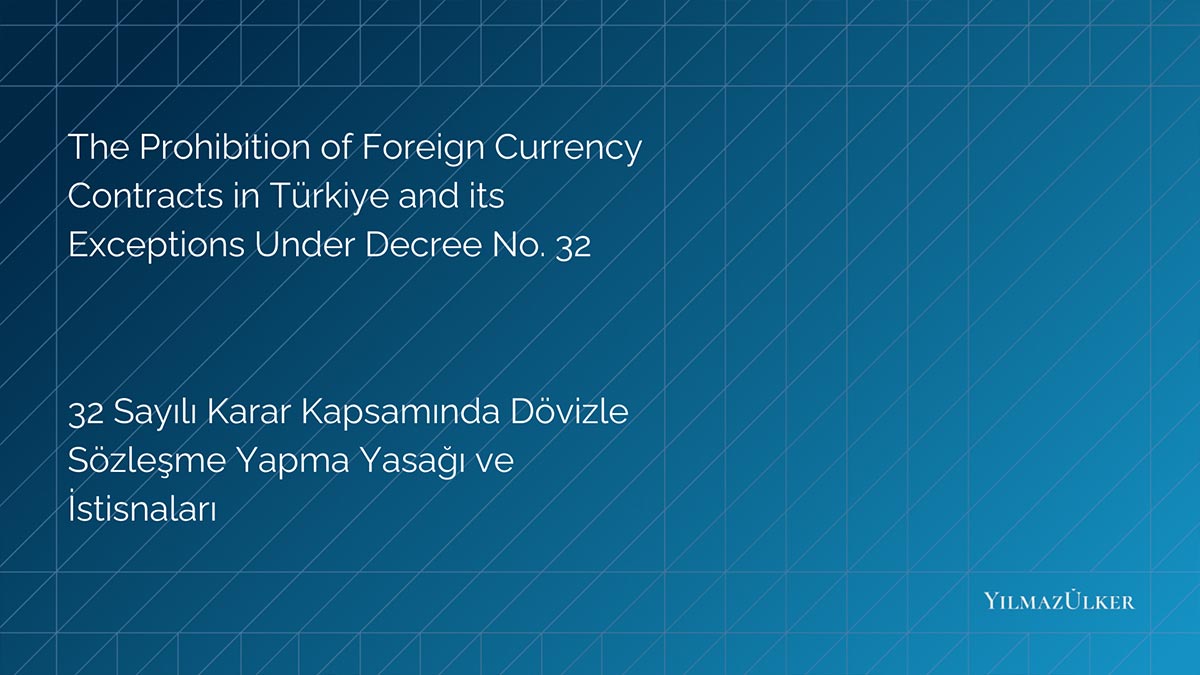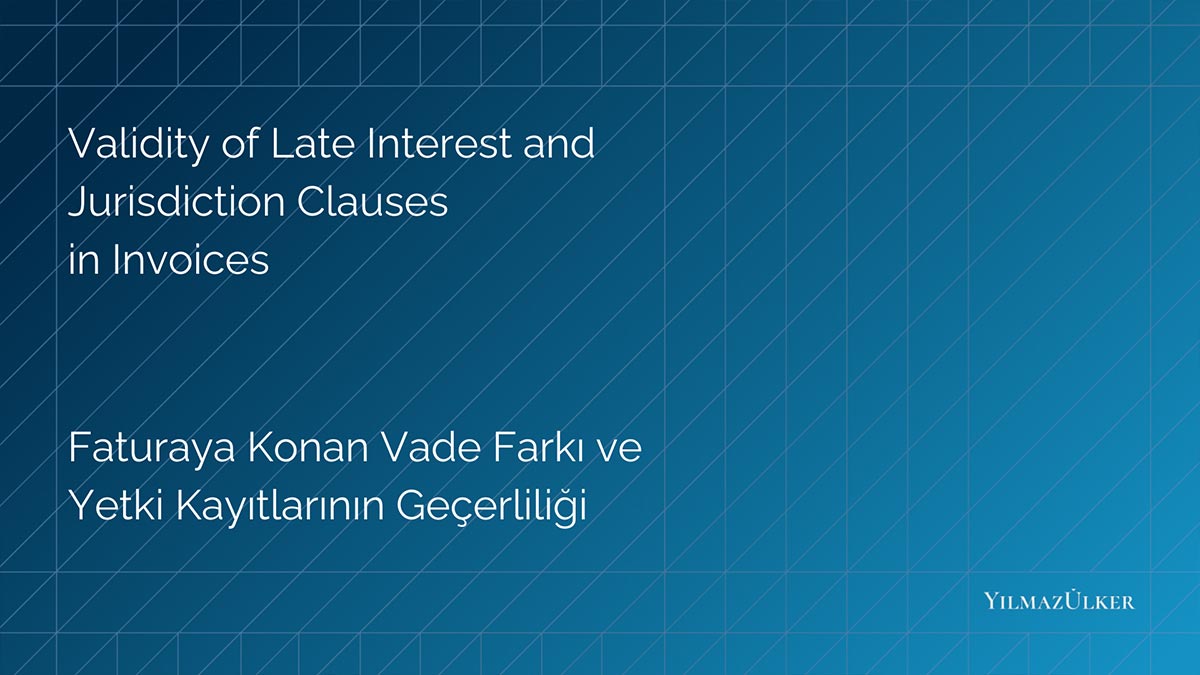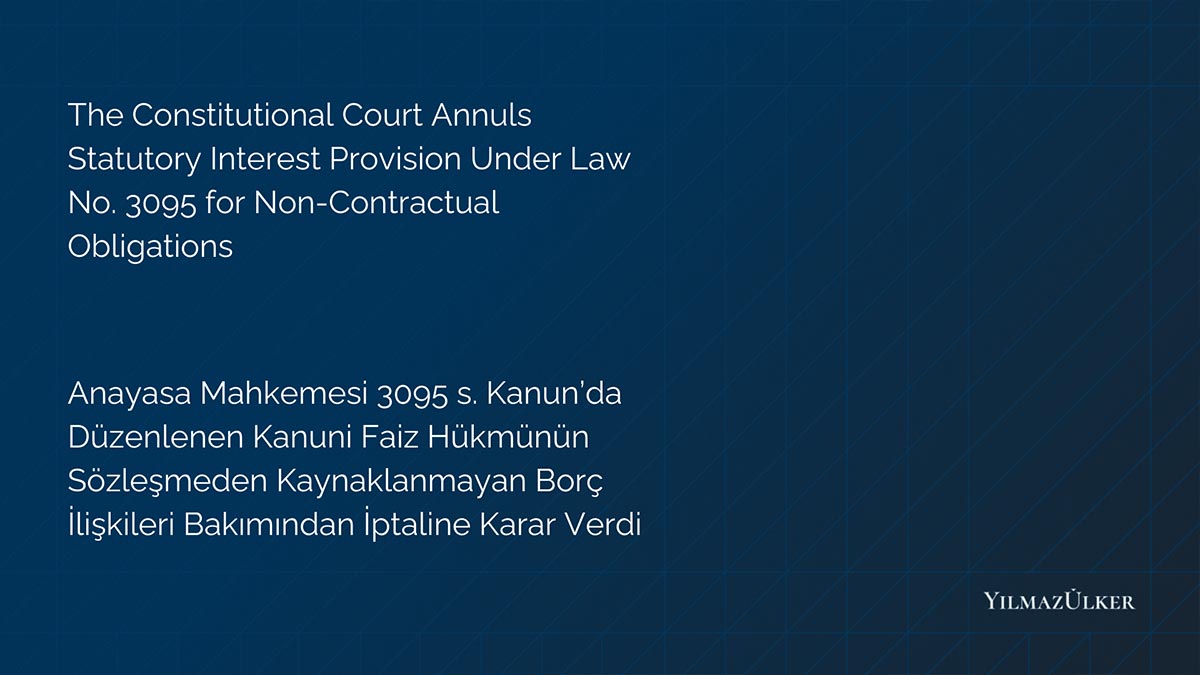Actualités & Publications

The Prohibition of Foreign Currency Contracts in Türkiye & Its Exceptions Under Decree No. 32
Decree No. 32 on the Protection of the Value of Turkish Currency
Decree No. 32 on the Protection of the Value of Turkish Currency (“Decree No. 32”), enacted on the basis of Law No. 1567 on the Protection of the Value of Turkish Currency, aims to preserve the stability of the Turkish lira and to limit economic risks arising from foreign currency-based transactions. In this context, it grants the Ministry of Treasury and Finance (“Ministry”) various regulatory and restrictive powers.
Prohibition on Foreign Currency Contracts in Türkiye Under Decrees Issued Pursuant to Decree No. 32
In accordance with the authority granted to it, the Ministry ensures the implementation of Decree No. 32 through secondary legislation, such as communiqués and circulars.
The first comprehensive regulation concerning the implementation of Decree No. 32 was introduced through Communiqué No. 2008-32/34 on the Protection of the Value of Turkish Currency (“Communiqué”). Communiqué sets out the detailed procedures and principles regarding the enforcement of Decree No. 32. Notably, it did not contain any provisions prohibiting contracts denominated in foreign currency.
Following the currency crisis in Türkiye in 2018 and in an effort to mitigate the negative economic impact of excessive exchange rate fluctuations, Decree No. 32 was amended by the Presidential Decree No. 85. Under this amendment, Turkish residents were prohibited from determining contract values and related payment obligations in foreign currency or indexed to foreign currency for certain types of contracts between themselves. The types of contracts falling within the scope of this prohibition include movable and immovable property sales contracts, all types of rental contracts for movable and immovable property (including vehicle and financial leasing), as well as contracts for labor, service, and construction.
The first regulation introducing the implementation and exceptions to the foreign currency contract prohibition came into force through Communiqué No. 2018-32/52 amending the Communiqué. Since 2018, the provisions regarding the prohibition have been amended and expanded multiple times. Notable amendments have been introduced through Communiqués No. 2019-32/54, 2020-32/55, 32/56, and 32/57, 2021-32/58, 2022-32/59, 2023-32/60, and 2024-32/61. The most recent amendment was enacted recently via Communiqué No. 2025-32/72.
Exceptions to the Prohibition on Foreign Currency Contracts
It is observed that the comprehensive restrictions imposed on foreign currency-denominated contracts by the initial amendment in 2018 have been gradually relaxed through subsequent amendments in the following years. In this regard, the current exceptions to the prohibition on foreign currency contracts, as revised under the most recent regulation introduced by Communiqué No. 2025-32/72, are summarized in the table below.
| Exceptions | Practical Examples |
|---|---|
|
Service Contracts Related to Exports, Transit Trade, Export-Equivalent Sales and Deliveries, and Foreign Currency-Earning Services and Activities |
A software development company based in Ankara enters into a service contract, denominated in foreign currency, to develop a customized transportation management system for a logistics company based in Germany. |
|
Employment Contracts for Services to Be Performed Abroad |
A construction company headquartered in Türkiye undertakes a stadium construction project in Qatar. Engineers, architects, technicians, and field workers hired from Türkiye reside in Qatar during the project. Their employment contracts are concluded in foreign currency.
|
|
Employment Contracts Involving Seafarers |
Employment contracts concluded in foreign currency between seafarers, as defined under the Maritime Labor Law, and their employers. |
|
Employment Contracts Involving Foreign Nationals |
An international consulting firm operating in Istanbul enters into a foreign currency-denominated employment contract with a German national financial advisor hired for a short-term project in Türkiye. |
|
Employment Contracts Concluded by Companies Operating in Free Zones |
A 100% domestically owned textile export company located in the Aegean Free Zone in İzmir exports garments to Germany. The employment contract with a sales coordinator to be based in its free zone office is concluded in foreign currency. |
|
Accommodation Service Contracts Between Residents in Türkiye and Licensed Hospitality Establishments Certified by The Ministry of Culture and Tourism |
A five-star hotel in Istanbul, licensed by the Ministry of Culture and Tourism, enters into a foreign currency-denominated accommodation contract with a US-based tour operator for a group reservation of 300 guests for the 2025 summer season. |
|
Construction Contracts Involving Foreign Currency-Based Costs |
A Turkish health technology firm undertakes the installation of a comprehensive building automation system for a city hospital. The contract for importing the necessary equipment from Germany and Japan is concluded in foreign currency. |
|
License And Service Contracts Involving Software, Licensing, And Technology Transfer |
A private bank in Istanbul signs a service contract, denominated in foreign currency, with a software company based in Ankara for the purchase of a cybersecurity solution, including licensing, updates, and maintenance. |
|
Service Contracts Involving Foreign Parties |
A fintech company based in Istanbul contracts a US-based cybersecurity consultant to support the development of a new payment infrastructure, under a foreign currency-denominated contract. |
|
Service Contracts Linked to International Transactions |
A logistics company headquartered in Istanbul enters into a foreign currency-based contract with a foreign trade company based in Edirne for customs clearance, international transportation, and distribution services related to exports to Germany. |
|
Contracts (Excluding Immovable Property Contracts) Involving Public Institutions or Companies of the Turkish Armed Forces Foundation |
ASELSAN, a company affiliated with the Turkish Armed Forces Foundation (TSKGV), enters into a foreign currency-based contract with a private domestic company for the production of optical imaging systems as part of a national defense project. |
|
Contracts (Excluding Immovable Property Contracts) Concluded by Public Institutions Within the Scope of Foreign Currency or Foreign Currency-Indexed Tenders, Contracts, and International Contracts, Including Those Entered into by Contractors with Third Parties |
Türkiye signs an international contract with the European Union for a major transportation infrastructure project involving metro line construction. Within the framework of the contract, a Turkish contractor enters into a foreign currency-based supply contract with a foreign company. |
|
Contracts Concluded by Banks Under Law No. 4749 |
A Turkish bank enters into a foreign currency-denominated loan contract with an international financial institution to finance an infrastructure project. |
|
Capital Markets Transactions Under Law No. 6362 |
A Turkish investor engages in foreign currency-denominated transactions involving the purchase and sale of bonds issued by a foreign company in international markets. |
|
Movable Property Sales Contracts Other Than Vehicle Sales |
A construction company based in Türkiye concludes a foreign currency-based sales contract with a domestic supplier for the purchase of construction machinery. |
|
Financial Leasing of Ships and Loans Related Thereto |
A maritime company based in Türkiye enters into a foreign currency-denominated financial leasing contract with a foreign leasing company for the lease of a vessel to expand its fleet. |
|
Aviation-Related Contracts Other Than Immovable Property and Employment Contracts |
A Turkish airline company concludes a foreign currency-based contract with a domestic aircraft maintenance firm for aircraft repair and maintenance services. |
Failure to observe the exceptions listed above and entering into transactions in violation of the foreign currency restriction may result in significant legal consequences, particularly for companies. In such cases, the General Directorate of Financial Markets and Foreign Exchange under the Ministry of Treasury and Finance may notify the competent Office of the Chief Public Prosecutor. Where the necessary legal elements are present, administrative sanctions -such as monetary fines- may be imposed.
Analysis
Decree No. 32 and the related regulatory framework establish a significant economic control mechanism aimed at curbing the depreciation of the Turkish lira. The secondary legislation limiting the use of foreign currency in contractual relationships -and the exceptions thereto- forms a dynamic legal framework that must be closely monitored by both domestic and foreign investors operating in Türkiye. Misapplication or incomplete application of these exceptions may lead to administrative penalties.
The above information reflects the general assessments of YılmazÜlker Attorney Partnership ("YılmazÜlker") regarding the subject matter and do not constitute legal opinion or legal consultancy services. Before taking any action based on the matters stated herein, it is recommended to seek professional legal advice by considering the specific circumstances of the case. YılmazÜlker shall not be held liable for any consequences arising from or in connection with the content of this document.






#YilmazUlker #DecreeNo32 #ForeignCurrencyContracts #TurkishEconomy #Publication